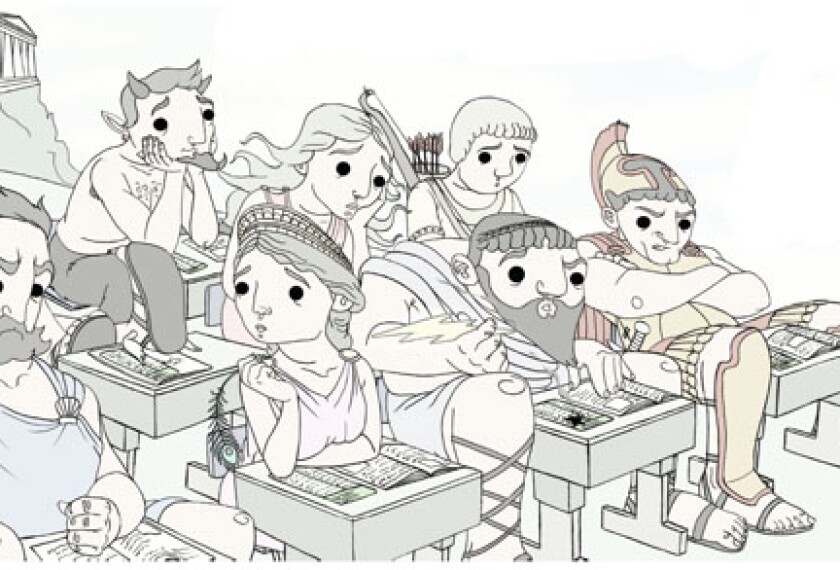June 11, 2008
Education Week, Vol. 27, Issue 41
College & Workforce Readiness
Chicago District Focusing On Pathways to College
The Chicago school district has taken a comprehensive approach to try to remove roadblocks for college-bound students through its 5-year-old department of postsecondary education and student development.
Federal
Principals’ Group Calls for National Academic Standards and Tests
The National Association of Secondary School Principals calls on Congress to appoint an independent panel to come up with guidelines for what students should know and be able to do in reading and mathematics at each grade level.
Federal
Report Roundup
National Identity
The United States’ national identity is eroding, according to a majority of respondents in a new survey.
Education Funding
Report Roundup
Spending Priorities
A new report says most district's financial decisions are made by middle-level managers.
Education
Report Roundup
Catholic Schools
Early findings from a new research effort suggest that low-income minority students attending Catholic schools in the Los Angeles area are staying in school and graduating at high rates.
Curriculum
Report Roundup
Somber Students Found to Outperform Cheerful Students
A new study found that children who feel happy don’t do as well on tasks that require precision as their peers who are sad or have neutral feelings.
School & District Management
Majority of Youths Found to Lack a Direction in Life
Educators, parents, and communities should make a more concerted effort to help rudderless youths find a clear direction and purpose as they enter adulthood, suggests a new book.
Federal
What Works Offers ‘Quick Reviews’ of New Studies
The federally supported What Works Clearinghouse has launched a series of “quick reviews” to assess the methodological soundness of studies that have made national news.
Federal
Schooling Issue a Complication for Foster Care
Policymakers are sharpening their focus on the educational needs of children in foster care, a population which has doubled in the past two decades.
Teaching Profession
Jumbo Payout Gets Fierce N.J. Backlash
Criticism came from state officials after a longtime New Jersey superintendent received a $500,000 retirement package.
Education Funding
Illinois Spending Remains in Flux
State lawmakers in Illinois recently approved a fiscal 2009 budget that would provide hundreds of millions of dollars more for schools—though it appears their work in crafting a spending plan is not yet complete.
Federal
Federal File
Regulations Face a Sunset Provision
The clock is ticking on the Bush administration’s effort to revise rules for the No Child Left Behind Act and the Family Educational Rights and Privacy Act.
Education
Letter to the Editor
The ‘Fundamental Flaw’ in Test-Scoring Systems
Jay C. Powell takes issue with details of Randi Weingarten's proposal for a four-pillared school evaluation system.
Education
Letter to the Editor
The Reverse Incentive of Rewards for Learning
To the Editor:
It is ironic that the research reported in your story "Reading Scores Given ‘Bump’ By Student Incentives, Study Finds" (June 4, 2008) came from Stanford University’s Center for Research on Education Outcomes. After all, it was the Stanford psychologist Mark R. Lepper, working with colleagues 35 years ago, who found that extrinsically rewarding children subsequently causes them to have less intrinsic interest in whatever it is for which they are being rewarded. So, for example, in Mr. Lepper’s and others’ studies, children who liked to draw and were given prizes for their drawings later were found to want to draw less than another matched group of children who received no prizes.
It is ironic that the research reported in your story "Reading Scores Given ‘Bump’ By Student Incentives, Study Finds" (June 4, 2008) came from Stanford University’s Center for Research on Education Outcomes. After all, it was the Stanford psychologist Mark R. Lepper, working with colleagues 35 years ago, who found that extrinsically rewarding children subsequently causes them to have less intrinsic interest in whatever it is for which they are being rewarded. So, for example, in Mr. Lepper’s and others’ studies, children who liked to draw and were given prizes for their drawings later were found to want to draw less than another matched group of children who received no prizes.
Education
Letter to the Editor
Pay More to Those Who Teach 9th Graders
To the Editor:
Regarding your June 4, 2008, article "Phila. 9th Graders Found to Get Least-Seasoned Teachers":
Regarding your June 4, 2008, article "Phila. 9th Graders Found to Get Least-Seasoned Teachers":
Teacher Preparation
Opinion
Busywork 101
Teacher Jay M. Solomon describes the inadequacies of teacher training.
Classroom Technology
Opinion
The Impending Death of Face-to-Face Instruction
William J. Price, a professor of education, explains why he's avoided teaching online courses.
School Climate & Safety
Opinion
Zero Tolerance: The School Woodshed
Rhonda B. Armistead says zero-tolerance policies "fail to take into account the intricacies of child development, individual characteristics, risk factors, and underlying causes."
School & District Management
Delaware Rolling Out New Evaluations for Principals
Delaware rolls out a new method to judge performance of principals and district-level administrators that ties leadership to student achievement.
Federal
Opinion
Quick Fixes, Test Scores, and the Global Economy
Iris C. Rotberg comments on the education myths that have become the basis of rhetoric and policy.
Federal
Candidates Are at Odds Over K-12
The presumed November matchup produced by the long presidential-primary season that ended last week offers contrasting approaches to K-12 policy, along with some common ground on the basics of the No Child Left Behind Act.
Federal
Kennedy’s Illness Raises Doubts for NCLB
Now that a key author of the law and the chairman of the Senate education committee has been diagnosed with a form of brain cancer, prospects for reauthorization have become even murkier.
Federal
Lessons at the Museum
Urban Advantage goes further than most museum-to-school outreach efforts in connecting students’ field trips to science centers directly back to the school curriculum.
IT Infrastructure & Management
Student Loses Discipline Case For Blog Remarks
The Internet age continues to raise new questions about when off-campus behavior comes under the authority of public schools.
Equity & Diversity
Teachers Achieving 'Highly Qualified' Status on the Rise
Data show an increase of 7 percentage points in the total number of highly qualified teachers nationwide since 2003-04.
Classroom Technology
Arizona E-Learning Advocates Press to Keep Initiative’s Momentum
Backers of digital curricula seek to keep momentum on an effort they see as crucial to business development, workforce improvement and research.
Early Childhood
Long-Term Payoff Seen From Early-Childhood Education
The latest analysis of an early-childhood-education program for children of low-income families in Chicago says that for every dollar spent, almost $10 is returned by age 25 in either benefits to society or to the participant.
Curriculum
Review Criticizes Textbooks' Take on Middle East, Islam
Content on the culture and religion of the Middle East is more plentiful, but publishers continue to fail in giving key topics careful and complete treatment, the study says.
Federal
Proposed ELL Guidelines Criticized as Too Rigid
The proposal by the U.S. Department of Education would curb states' flexibility in deciding when children are fluent in English and if they still need special services for ELLs, critics argue.




